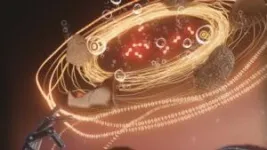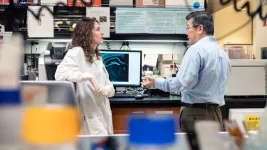One step closer to Mars immigration
AI chemist synthesizes catalyst for oxygen production from Martian meteorites
2023-11-13
(Press-News.org)
Immigration to and living on Mars have long been depicted in science fiction works. But before dream turns into reality, there is a hurdle man has to overcome -- the lack of essential chemicals such as oxygen for long-term survival on the planet. However, hope looms up thanks to recent discovery of water activity on Mars.
Scientists are now exploring the possibility of decomposing water to produce oxygen through electrochemical water oxidation driven by solar power with the help of oxygen evolution reaction (OER) catalysts. The challenge is to find a way to synthesize these catalysts in situ using materials on Mars, instead of transporting them from the Earth, which is of high cost.
To tackle this problem, a team led by Prof. LUO Yi, Prof. JIANG Jun, and Prof. SHANG Weiwei from the University of Science and Technology of China (USTC) of the Chinese Academy of Sciences (CAS), recently made it possible to synthesize and optimize OER catalysts automatically from Martian meteorites with their robotic artificial intelligence (AI)-chemist.
Their research, in collaboration with Deep Space Exploration Laboratory, was published in Nature Synthesis on November 13th.
“The AI chemist innovatively synthesize OER catalyst using Martian material based on interdisciplinary cooperation,” said Prof. LUO Yi, leading scientist of the team.
In each experimental cycle, the AI chemist first analyzes the elemental composition of the Martian ores using the laser-induced breakdown spectroscopy (LIBS) as its eyes. Then, it carries out a series of pretreatments on the ores, including weighing in the solid-dispensing workstation, preparing feedstock solutions in the liquid-dispensing workstation, separation from liquid in the centrifugation workstation, and solidification in the dryer workstation.
The resulting metal hydroxides are treated with Nafion adhesive to prepare the working electrode for OER testing at the electrochemical workstation. The testing data are sent to the computational ‘brain’ of the AI chemist in real-time for machine learning (ML) processing.
The AI chemist’s ‘brain’ employs quantum chemistry and molecular dynamics simulations for 30,000 of high-entropy hydroxides with different elemental ratios and calculates their OER catalytic activities via density functional theory. The simulation data are used to train a neural network model for rapidly predicting the catalysts activities with different elemental compositions.
Finally, through Bayesian optimization, the ‘brain’ predicts the combination of available Martian ores needed for synthesizing the optimal OER catalyst.
So far, the AI chemist has created an excellent catalyst using five types of Martian meteorites under unmanned conditions. This catalyst can operate steadily for over 550,000 seconds at a current density of 10 mA cm-2 and an overpotential of 445.1 mV. A further test at -37 °C, the temperature on Mars, confirmed that the catalyst can steadily produce oxygen without any apparent degradation.
Within two months, the AI chemist has completed the complex optimization of catalysts that would take 2000 years for a human chemist.
The team are working to turn the AI chemist into a general experiment platform for various chemical synthesis without human intervention. The reviewer of the paper highly remarked:”this type of research is of wide interest and is under rapid development in organic/inorganic material synthesis and discovery.”
“In the future, humans can establish oxygen factory on Mars with the assistance of AI chemist,” said JIANG. Only 15 hours of solar irradiation is needed to produce sufficient oxygen concentration required for human survival. “This breakthrough technology brings us one step closer to achieving our dream of living on Mars,” he said.
END
[Attachments] See images for this press release:


ELSE PRESS RELEASES FROM THIS DATE:
2023-11-13
Young adults are now more likely to vape than to use traditional cigarettes. After years of public health success in decreasing the numbers of people using cigarettes, researchers are seeing striking increases in the numbers of young people who use e-cigarettes regularly – so much so that, for the first time, there are more young people who begin to use nicotine through vaping rather than through cigarettes.
“We now have a shift such that there are more ‘never smokers’ who vape than established smokers,” ...
2023-11-13
About The Study: This analysis finds that COVID-19 and the drug overdose epidemic were major contributors to the widening gender gap in life expectancy (nearly six years) between women and men in recent years. Men experienced higher COVID-19 death rates for likely multifactorial reasons, including higher burden of comorbidities and differences in health behaviors and socioeconomic factors, such as labor force participation, incarceration, and homelessness. Differentially worsening mortality from diabetes, heart disease, homicide, and suicide suggest that chronic metabolic disease and mental illness may also contribute.
Authors: Brandon W. Yan, M.D., ...
2023-11-13
About The Study: The data from this nationally representative survey study reveal a shift in tobacco use among young adults (ages 18-24), showing historically low cigarette use, which has positive public health significance. However, e-cigarette use is higher (14.5%) than reported previously, coinciding with the introduction of salt-based devices in 2015 to 2018. Over half of established vaping young adults never regularly smoked. Research suggests that exclusive e-cigarette users are unlikely to ...
2023-11-13
About The Study: The findings of this study indicate an increase in the prevalence of breastfeeding initiation and breastfeeding duration at 12 months from 1999 to 2018 in the U.S. Temporal changes of breastfeeding duration at 12 months were more prevalent among male infants, older mothers, Mexican American and multiracial participants, and households with higher income.
Authors: Yongjun Zhang, Ph.D., M.D., of the Shanghai Jiao Tong University School of Medicine in Shanghai, is the corresponding author.
To access ...
2023-11-13
Nearly one in five school-aged children and preteens now take melatonin for sleep, and some parents routinely give the hormone to preschoolers, according to new research from the University of Colorado Boulder published Nov. 13 in JAMA Pediatrics.
This concerns the authors, who note that safety and efficacy data surrounding the products are slim, such dietary supplements lack full regulation by the Food and Drug Administration.
“We hope this paper raises awareness for parents and clinicians, and sounds the alarm for the scientific community,” said lead author Lauren Hartstein, PhD, a postdoctoral fellow ...
2023-11-13
San Francisco—November 13, 2023—Researchers at Gladstone Institutes have discovered that a rare genetic variant known as the “Christchurch mutation” can block detrimental effects of apolipoprotein E4, the best-established risk factor for the most common form of Alzheimer’s disease.
The apolipoprotein E (APOE) gene has long been known to affect the risk of Alzheimer’s disease through its three main variants: E2 (low risk), E3 (intermediate risk), and E4 (high risk). More recently, a ...
2023-11-13
Scientists know very little about conditions in the ocean when life first evolved, but new research published in Nature Geoscience has revealed how geological processes controlled which nutrients were available to fuel their development.
All life uses nutrients such as zinc and copper to form proteins. The oldest lifeforms evolved in the Archean Eon, three and a half billion years before the dinosaurs first appeared. These microbes showed a preference for metals such as molybdenum and manganese compared to their more recent counterparts. This ...
2023-11-13
Fasting interventions, which involve alternating periods of fasting and refeeding, are generally thought to improve health. But these interventions don’t work as well in old animals. The question is: Why? By studying the short-lived killifish, researchers at the Max Planck Institute for Biology of Ageing in Cologne have shown that older fish deviate from a youthful fasting and refeeding cycle, and instead enter a state of perpetual fasting, even when ingesting food. However, the benefits of refeeding after fasting in old killifish can be restored by genetically activating a specific subunit of AMP kinase, an important sensor ...
2023-11-13
A new element of the catastrophic impacts of climate change is emerging – how global warming is impacting the human brain.
In a paper published today in Nature Climate Change, an international team of academics explore the ways in which research has shown that a changing environment affects how our brains work, and how climate change could impact our brain function in the future. The paper is led by the University of Vienna with input from the universities of Geneva, New York, Chicago, Washington, Stanford, Exeter in the UK and the Max Plank Institute in Berlin. It also explores the role that neuroscientists can play in further understanding and addressing ...
2023-11-13
Research Highlights:
In a 3-year trial, intensive treatment with antihypertensive medication to reduce systolic blood pressure, the top number, to less than 120 mm Hg reduced cardiovascular disease events among people at high-risk for cardiovascular disease by 12% compared to standard treatment with a target of less than 140 mm Hg.
The effects were consistent regardless of participants’ diabetes status (Type 1, Type 2 or none) or history of stroke.
Embargoed until 8 a.m. ET, Monday, Nov. 13, 2023
PHILADELPHIA, ...
LAST 30 PRESS RELEASES:
[Press-News.org] One step closer to Mars immigration
AI chemist synthesizes catalyst for oxygen production from Martian meteorites




